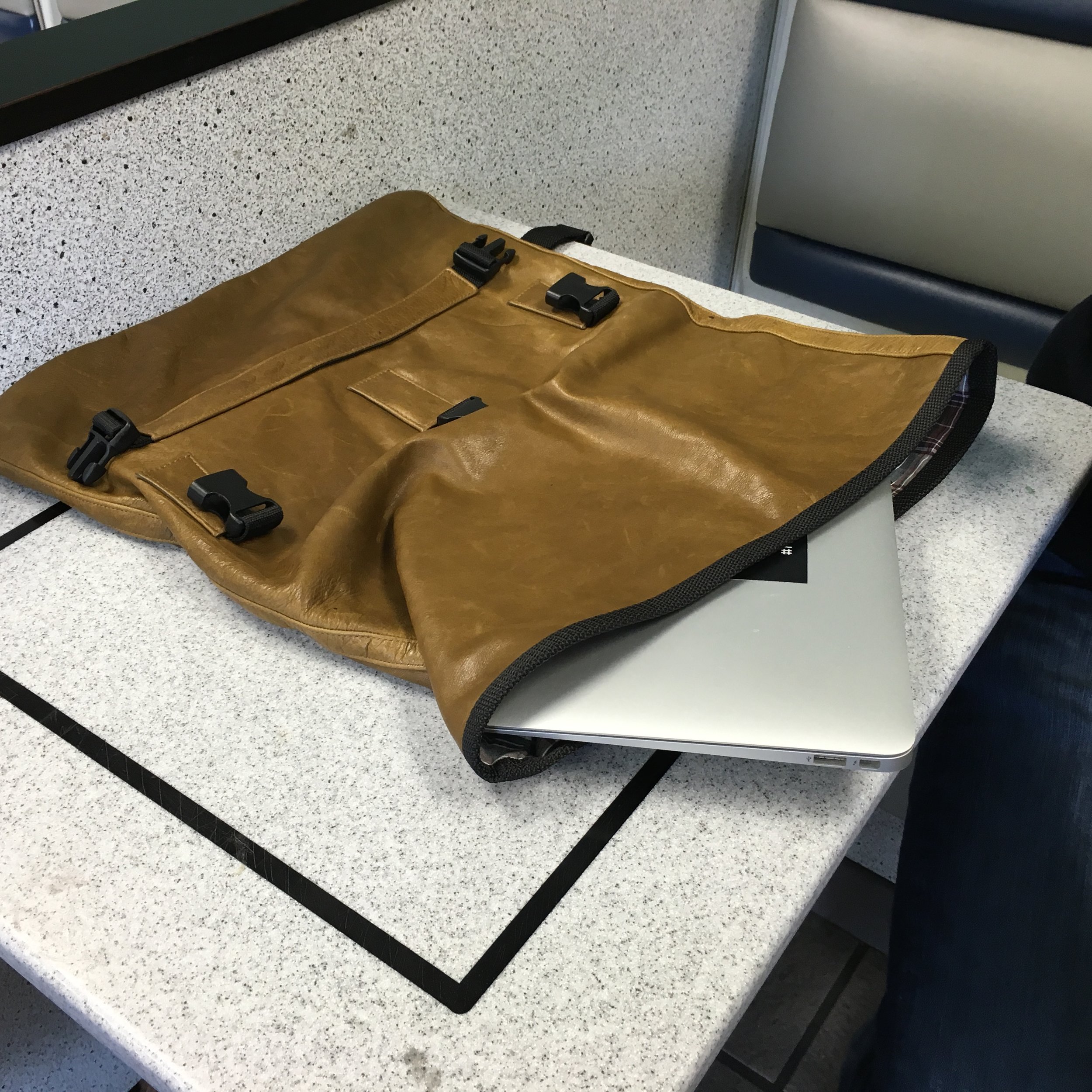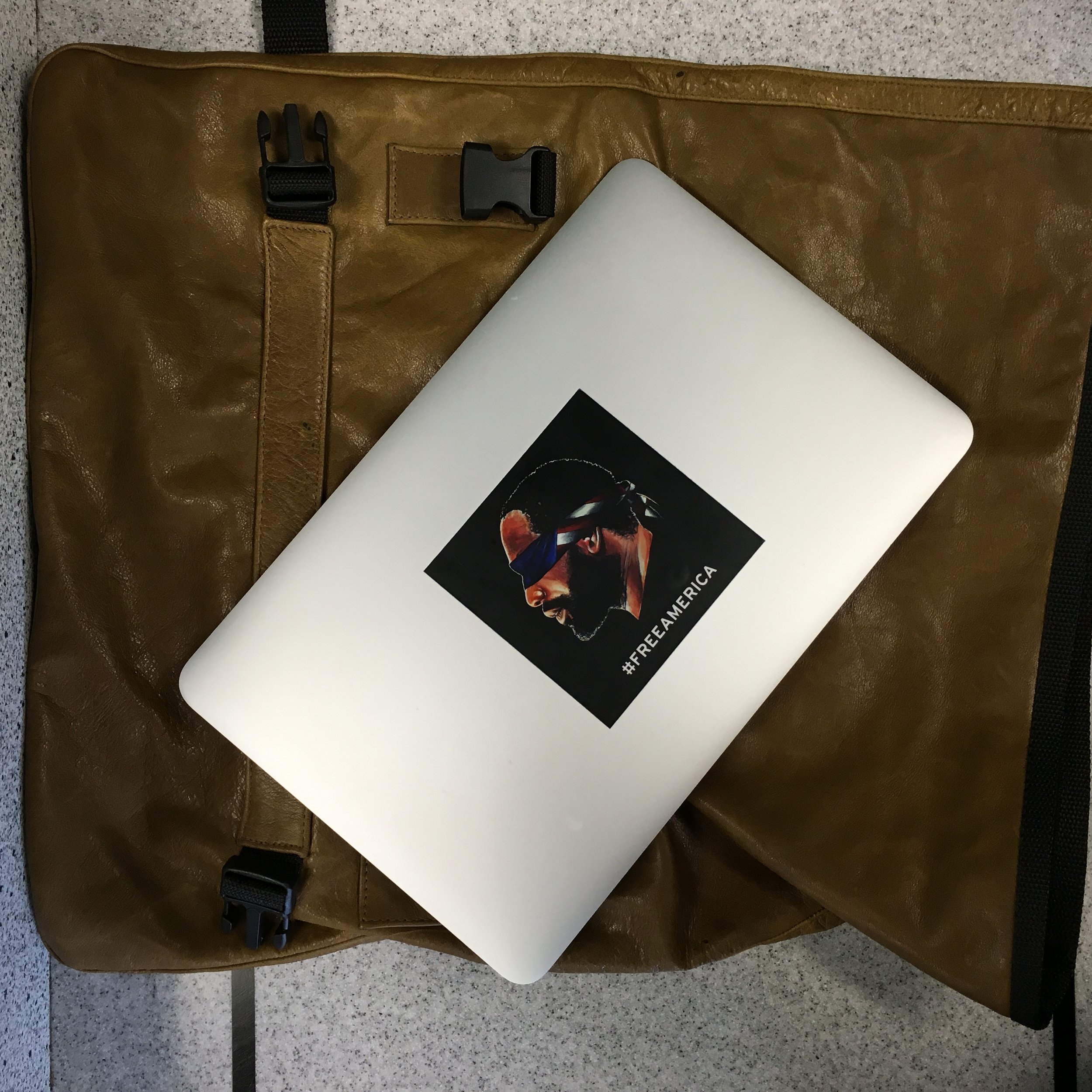Today on the blog I talk to Brandale Randolph. His new venture, The 1854 Cycling Company, marries high-end design principles with social entrepreneurship. Before moving to Massachusetts and starting the company, Randolph founded Project: Poverty in Lubbock, TX, where his anti-poverty work formed the basis of his 2014 TEDxTalk, “Stop throwing breakfast sandwiches at the poor.” This is the second part of a two-part interview, wherein Randolph and I discuss the intersections of entrepreneurship and social justice work; the continuity of social movements across eras; and whether it’s a good idea to make abolition seem “cool.” You can read the first part here.
"The Garrison," the first model offered by The 1854 Cycling Company. All of the bikes will be named after abolitionists. Photo credit- Totsey Bass.
Me: Tell me about the bikes themselves. The slogan is “Bikes, Bags Abolition.” I could talk about the abolition part forever, so talk about the other two things.
Randolph: I wanted to make a bike that’s durable. We did the steel frame. The leather appointments are based on making the bikes more upscale. We don’t appreciate just how upscale bikes can be. There are cities where people don’t even own cars, but they will display their bikes as a show of status. Our bikes should be a form of transportation and a work of art too. The bags also are functional works of art. I want them to be able to be attached to the frame, but also functional enough to carry laptops and small devices. The leather of the bag matches the leather on the seat and pedals, which gives it a rich appeal.
There’s crowded space where stuff is cheap. I can’t do anything with the proceeds of a cheap product. I can’t employ people. I can’t donate the money. I can’t generate wealth. The other thing that motivates me is that a lot of companies say they’re doing social justice work, but they’re not. Shinola turned out to be a scam. They’re owned by Fossil, and the bags and bicycles aren’t really made in Detroit. They’re assembled there, but they don’t employ the people who need the most help. Same thing with Tom’s shoes. The quality of the shoe that they give to the people that they’re donating is not the same as the quality of the shoe that you buy. If you’re going to be a social enterprise, do the dang work. That’s the advantage of having a nonprofit background. I ‘m used to doing the dang work. It’s not a game for me, it’s not a marketing plan.
In our next phase of work, you’ll see ten to twelve people employed at 1854. That will be thanks to the people who have purchased bikes and bags on preorder. Part of the movement to buy Black, so to speak, is to make sure that we sell items that Black owners design, manufacture and produce. We also need to employ Black and make an explicit commitment to hiring ex-offenders. I believe that Black entrepreneurs need to be more like Robin Hoods. Will this scare off people of other races who might think it’s racist to talk about this in the context of a company? Probably. But for all of the people who see the bigger issue, this could be something bigger.
Me: What you’re trying to do is tricky, as you’re at the launch stage of something for which you have a much larger vision. I think people will see your nonprofit and assume good intentions, but how do you propose to hold yourself accountable for the broader social mission of your enterprise?
Randolph: Every year, I want to have an annual report that lists the number of ex-offenders we’ve hired, juvenile records that we’ve paid to have expunged, and an actual accounting of the dollars we’ve contributed from the receipts. I want to have that in an annual report that people can read. I have a big dream, and it may not come to pass. I have a dream of introducing a new product every ear, and at the release of that new product, we report on the funds that we’ve dedicated to our social mission. Whether it’s employment statistics, or the background of the people we’ve hired and helped. I want it to be like the Apple keynote, but with a focus on the number of people we’ve helped. The only way that society changes is if we’re helping people while doing the actual work.
One of my pet peeves is treating social justice like the soccer ball in a four-year-old soccer league. We identify an issue, and everyone crowds around it. That’s not how the world changes. Everyone has to play a different role. I’m not a sociologist, I’m not an attorney. I’m not even one of those people who is into politics. But I am an entrepreneur, I think my role is to take my gift for creating ventures to move the social justice needle. If your role is education, push education. If your role is journalism, be a journalist.
Me: So speaking of journalism, you had a little beef with a very specific journalist, Shaun King, last year. Is that over?
Randolph: Yes, I have no animosity towards the man, and I’m excited by what he’s done. Some of that stuff was due to frustration of having a movement ready to be galvanized, with people ready to go. Now, a year after that, he has taken his role as a journalist very seriously. He’s written powerful articles to keep the movement informed. It’s difficult for any of us to change, and he made a positive change that’s been great for the movement. I think that’s kind of an example of people growing and finding a role in the fight for social justice.
Me: You’re in the midst of starting an actual business, and you’re committed to talking openly about the connection between your role as an entrepreneur and the movement for Black lives. Last night was the first presidential debate between Clinton and Trump. Do you think the broader mood of the country, even the presidential election, will affect your business?
Randolph: One thing that scared the crap out of me during the debate was the discussion of “stop-and-frisk.” Anthony Burns was stopped by a police officer for being in the middle of the street. We’re still stopping Black people for being in the middle of the street. There was no sign on Anthony Burns that said he was a runaway slave, but he was arrested anyway. When we talk about “law and order,” that scares me. That’s going to lead to more ex-offenders being arrested for no reason. That will increase mass incarceration and crime. With “law and order” comes the idea that people are permanent criminals, and that scares me.
We also have an idea amongst some people that there is a proper “way to protest.” Those people have not seen real protest. What this country has done in the last two hundred years is crazy. We had abolitionists burning the Constitution. Black pastors were stealing men out of courtrooms at gunpoint. We had abolitionists fighting the US Army for taking a runaway enslaved man away. The forgetting of American history is why America gets mad that a man is kneeling at a football game.
Me: So, you have t-shirts that say “Abolitionist” that you’re planning to use as part of your marketing plan. We’ve talked about the risk of this explicit connection, but there’s a bigger ethical question here. Is it okay to make this kind of work “fun” or “cool?”
Randolph: By talking about abolitionism, we’re connecting this current movement to a history that gives us an avenue and channel to work on social justice. Yes, we’re riding a symbol of a new form of abolition. I think it’s okay to make it cool. As long as people are down with our principles, and want to invest in the long-term goals of the movement, that’s okay. Purchasing the bike and bag helps employ someone. We haven’t had that conversation in years. Commerce, wealth, inequality, and social justice are entwined. It’s part of the intersectional discussion, social justice and poverty. We have to start at these different intersections, not just the ones that we’re told to cross, or given permission to discuss. We have to talk about women behind bars, and the challenges they face, and the idea that many female ex-offenders are the primary caregivers for children, and that the minimum wage isn’t going to cut it, especially for them.
Me: So what does being an abolitionist today, in 2016, mean to you?
Randolph: It’s part of the heritage. The idea of abolition is that we have systems that we need to abolish. There are systems that need to be not reformed, but abolished. The people that are willing to stand in the gap and abolish those systems are part of that heritage that stood against slavery. They’re cruel unjust systems. Without the bold contributions of people from all walks of life, that will not happen. I’m working on not just abolishing the criminal justice system as it is, but also poverty and other systems. If I’m going to do that, I need to understand the height of the giants on whose shoulders I sit.


